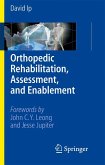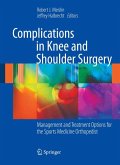Psychoprosthetics brings together the most recent and exciting research and knowledge in this new field into one easily accessible volume. It contributes to a better understanding of the complex human dynamics involved in prosthetic use and provides an analysis of the practice, research and theory in the field of psychoprosthetics.
Written by some of the leading experts to the field, this informative and cutting-edge text will be of relevance to students, practitioners and researchers from a wide range of disciplines, including prosthetics and orthotics, occupational therapy, physiotherapy, rehabilitation medicine, engineering, nursing and psychology.
Dieser Download kann aus rechtlichen Gründen nur mit Rechnungsadresse in A, B, BG, CY, CZ, D, DK, EW, E, FIN, F, GR, HR, H, IRL, I, LT, L, LR, M, NL, PL, P, R, S, SLO, SK ausgeliefert werden.
"Psychoprosthetics is an important new text for the field of rehabilitation. The editors are leaders in the field of psychology ... and have gathered together an excellent group of contributing authors. ... The chapters finish with a discussion of the research needed to advance the field ... . Psychoprosthetics is a reference text that should be embraced by clinicians of varied disciplines and expertise. ... This book likewise highlights the great need for further research in this important area of medicine." (Todd Alan Kuiken, JAMA, Vol. 299 (16), 2008)
"This book uses an interdisciplinary perspective to explore the psychosocial issues of persons who require prosthetic devices. ... This book has the most up-to-date research and references that one can find in the area of loss of limb and prosthetics. ... must for anyone who is a student, practitioner, and/or researcher who works or intends to work with a person who has a prosthetic devise. ... it is a book for professionals in all disciplines who work in the area of rehabilitation, and I agree." (Catherine S. Wilson, Doody's Review Service, February, 2010)









